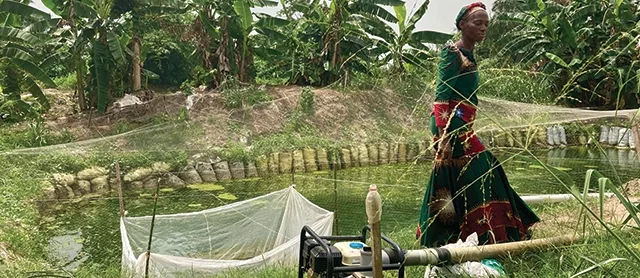Nigeria no doubt endowed with vast water resources with great potential of making remarkable transformation in its aquaculture sector especially with its extensive coastline, abundant freshwater sources and favorable climate conditions, the nation stand well among players to become a global leader in aquaculture production.
Although in recognition of this opportunity, Nigerian stakeholders have in the past focused their efforts on unlocking the untapped potential of the aquaculture industry, which it is believed can enable the way for sustainable growth and economic prosperity for the nation.
Aquaculture, or fish farming, is the practice of cultivating fish, mollusks, crustaceans, and other aquatic organisms in controlled environments. It offers a viable solution to meet the growing demand for fish and seafood products, which are critical sources of nutrition and protein for a rapidly expanding population.
The sector in Nigeria has been experiencing steady growth in recent years, driven by increasing demand for fish and seafood products.
According to the Food and Agriculture Organisation (FAO) of the United Nations, Nigeria’s aquaculture production accounted for about 600,000 metric tons in 2018 which represents a significant increase from previous years and demonstrates the sector’s potential for expansion.
Nigeria boasts a rich aquatic biodiversity, including various species of fish such as tilapia, catfish, and shrimp, which are well-suited for aquaculture.
In terms of domestic demand, Nigeria has a significant appetite for fish and seafood and per capita fish consumption has been rising steadily. According to the FAO, the average annual fish consumption per capita in Nigeria was estimated to be around 13 kilograms in 2018. This figure is expected to even continue increasing as the population grows and incomes rise, further driving the demand for aquaculture products.
According to experts, “Nigeria consumes about 2.97 million metric tons of fish per year but produces only about 1.07 million metric tons annually, leaving a huge deficit of about 1.9 million metric tons to importation with import bill of $1.2billion. Even the 1.07 million metric tons produced locally, only about 313,231 are produced through aquaculture, about 759,828 metric tons are through fisheries.”
One of the major initiatives undertaken by the Nigerian government is the National Fishery and Aquaculture Development Plan (NFADP). Launched in 2016, the plan aims to transform the aquaculture sector into a commercially viable and sustainable industry. It emphasizes the adoption of modern farming practices, improved access to credit and inputs for small-scale farmers, capacity building, and the creation of an enabling policy and regulatory environment.
The NFADP has paved the way for significant investments in aquaculture infrastructure, research and development, and technical training programs. Fish hatcheries, feed mills, and processing plants are being established across the country, creating employment opportunities and fostering local economic growth. These investments are not only driving the expansion of the aquaculture industry but also enhancing the value chain, from production to processing and distribution.
To facilitate market access and promote investment in the sector, Nigeria has also embarked on strategic partnerships with international organisations and neighboring countries. Collaboration with international development agencies and research institutions has facilitated knowledge exchange, technology transfer, and best practice sharing. Additionally, Nigeria is exploring regional cooperation in aquaculture, such as joint ventures and trade agreements, to strengthen the industry’s position in the global market.
The efforts to unlock the potential in aquaculture have already yielded promising results. Nigeria’s aquaculture production has steadily increased in recent years, meeting a significant portion of the country’s fish consumption demand. This upward trajectory is expected to continue as more farmers adopt modern techniques, advanced feed formulations, and efficient management practices. Moreover, the growing middle class and increasing consumer demand for fish and seafood present a lucrative market for Nigerian aquaculture products.
However, challenges still lie ahead on the path to unlocking the full potential of aquaculture in Nigeria. Limited access to finance, inadequate infrastructure, and a lack of skilled labor remain significant obstacles.
Addressing these issues requires continued investment in training and capacity building, improving rural infrastructure, and facilitating access to affordable credit and insurance services.
Furthermore, strict adherence to environmental and social sustainability practices is essential to ensure the long-term viability of the industry and prevent negative impacts on ecosystems and local communities.
Unlocking the potential in aquaculture is not just a pathway to economic growth but also a means to address critical social and environmental challenges. By reducing reliance on imported fish, Nigeria can enhance its food security and create jobs.





